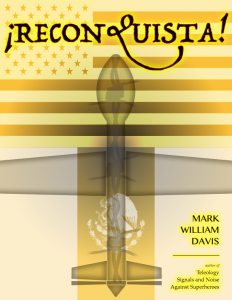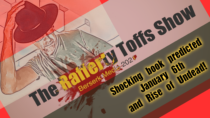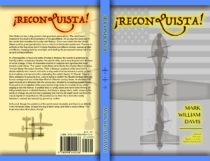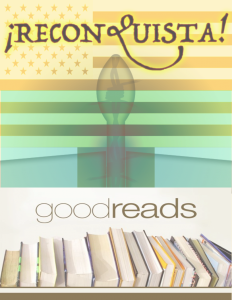I got on the Rafferty Toffs Show out of Tennessee to discuss ¡Reconquista!. I had never heard of the show but it is extremely popular on the ‘Chans according to many people. Some of the claims made by the guests are a bit questionable to my mind, but I love seeing critical thinking and a passion for literature!… Read the rest
Category: Fiction
¡Reconquista! Redux
¡Reconquista! is now available in paperback format with some additional editing (because there is rarely enough) and an alternative cover design. Pick it up now via reconquista.pub or direct from Amazon. I’m preparing for a book signing event in December with the Las Cruces Writers Group and need something a bit more tangible than an electronic book. But the movement towards NFTs and alternative distribution methods continues apace!… Read the rest
Gimmicky Nonfictional Fictional Futures
 Salman Rushdie’s new collection of essays, The Language of Truth, begins with an ecstatic celebration of the magical tales of old worlds—wonder tales as he would have it. As the foremost magical realist of the East in the West, Rushdie has thrived on collecting his own dreams against the literary trends of the times (realism/formalism/transgressivism/whateverism). Sage advice from a master: “Don’t write what you know unless it is really interesting” or just dream better dreams. Having myself drifted away from reading fiction in recent years (a known trend in the publishing industry) and towards more and more detailed nonfiction, from the mind-control capabilities of cat shit to the mathematical learning algorithms embedded in the universe, I am certainly guilty of exactly what Rushdie rails against (a damned philistine of sorts), though I am equally skeptical of the Knausgård-style auto-fiction that is recently idealized as a contemporary answer to the vexing question of what new literary hell we deserve.
Salman Rushdie’s new collection of essays, The Language of Truth, begins with an ecstatic celebration of the magical tales of old worlds—wonder tales as he would have it. As the foremost magical realist of the East in the West, Rushdie has thrived on collecting his own dreams against the literary trends of the times (realism/formalism/transgressivism/whateverism). Sage advice from a master: “Don’t write what you know unless it is really interesting” or just dream better dreams. Having myself drifted away from reading fiction in recent years (a known trend in the publishing industry) and towards more and more detailed nonfiction, from the mind-control capabilities of cat shit to the mathematical learning algorithms embedded in the universe, I am certainly guilty of exactly what Rushdie rails against (a damned philistine of sorts), though I am equally skeptical of the Knausgård-style auto-fiction that is recently idealized as a contemporary answer to the vexing question of what new literary hell we deserve.
Still, magical realism or Rushdie-an wonder tales are essentially gimmicks for conveying sometimes lofty (say the shaping of thinking by modernity in Gabriel García Márquez or the effects of colonialism in Rushdie’s own works; Devapriya Roy suggests all “global novels,” which is code for New York/American, are idealizations of liberalism that work towards world peace in some suffused sensibility), but also often trivial observations about ancient human traditions. Calling this a cornerstone of truth begs a deeper question about what truths are being exposed. Is it this universality of the desire for power or the vanity of men and women? Is it the threat imposed by female eroticism to the stability of society? Rushdie likes to think these are answered by these olden forms but a most modern mind begs for explanations of a different sort when trying to map them to our most modern experience of society.… Read the rest
The Twin Earth Dissonance Conspiracy
 I came of age with some of the mid-to-late 20th century literature that took conspiracies as truss work for calculated paranoia, from Pynchon’s Gravity’s Rainbow to Philip K. Dick’s identity shuffling, and on to the obscurely psychedelic Illuminati books by Robert Shea and Robert Anton Wilson. They were undoubtedly influenced by the dirty tricks and mind control fantasies and realities of the Cold War, from thallium and LSD poisoning plots against Fidel Castro to the Manchurian Candidate and John Birchers; from Dr. Strangelove to ratfucking in the Nixon-era Republican Party.
I came of age with some of the mid-to-late 20th century literature that took conspiracies as truss work for calculated paranoia, from Pynchon’s Gravity’s Rainbow to Philip K. Dick’s identity shuffling, and on to the obscurely psychedelic Illuminati books by Robert Shea and Robert Anton Wilson. They were undoubtedly influenced by the dirty tricks and mind control fantasies and realities of the Cold War, from thallium and LSD poisoning plots against Fidel Castro to the Manchurian Candidate and John Birchers; from Dr. Strangelove to ratfucking in the Nixon-era Republican Party.
The fiction paralleled and mimicked those realities but it was also infused with a kind of magical realism where the ideas permeated through the characters in a nexus of paranoia and fantasy. The reader was admitted to eccentric ways of structuring the history of the world and the motives of unseen forces acting through organizations, governments, and powerful people.
While endlessly fun, the fictional forms were also an inoculation: no mundane conspiracy could possibly capture that pulse of inside knowledge of a mystic firmament of lies and outlandish goals canopied above our earth-chained heads.
But here I am again, though much less amused and more fearful.
I think I read ten different reporting and opinion pieces today on the topic of Marjorie Taylor Greene, the shock-curiosity of the day who amplified QAnon, Jewish space lasers, political assassination fantasies, and likely a range of yet-to-be-discovered subjects of scorn and ridicule. Most analysts agree that such fantastical and angry ideas are methods for manipulating gullible people. They are tools for the acquisition of power over others.
The whole project feels like an alternative reality so late in America’s evolution, like we’ve transitioned to a Counter-Earth or Bizarro Htrae or Nabakov’s AntiTerra.… Read the rest
Preternatural: Excerpt from ¡Reconquista! on Crisis and Conflict in American Democracy
 Real conflict is both more mundane and heart-wrenching than the fictional version, but here is the climax, Chapter 16, of ¡Reconquista!, where everything unravels…
Real conflict is both more mundane and heart-wrenching than the fictional version, but here is the climax, Chapter 16, of ¡Reconquista!, where everything unravels…
The cross blue lightning should have been an omen to the gathered Baaad Hombres who retired to their RVs and trailers to drowse into their opioid cocoons. By dawn the storm had saturated the desert until the air smelled like ripe succulents and there were still more smoky masses to the north.
Herb surprised all of them while hunched around the pre-action fire barrel by telling them that he had another mission he had to take care of and wouldn’t be initially joining them on their raid. They looked over a map and he thought he could catch up to them on his bike around the Corralitos Ranch. They were planning to hold that point anyway. His initial mission was to manage the skies, he told them cryptically while pointing upward. Several of the men thought he was going to pray for them, which seemed to them acceptable but not very good timing for the critical time of action. They passed around green camouflage face paint. Several men wore ghillie suits in the colors of the desert, making them look like human hedgehogs as they darkened their faces with the paint.
By six thirty they were rolling, their ATVs piled high with extra fuel and ammunition. The storm was quiescent but Herb warned them that the arroyos might be flowing and they may need to plot an alternative course under the fencing. He crawled into his wrecker and turned on the devices. He had only a short window to get the systems working and he had to figure out how to enter the numbers that the pretty woman had given him.… Read the rest
Tusker Long: A Preview
 Preface and Introduction
Preface and Introduction
Howl fast, howl long, my litter, grown in the palmy summer, fed upon the teat, the mana, the spilled ichor of the world. Howl that you can know the beginnings and the tidings that cleaved, that rent the old world of subjugation, the cages, the death manacles of man-machinery and the singed world. Howl when you imbibe the tales of Tusker Long, the one who carried us forth from the bleak, and share the saga with the many species, who are like you in their rescue from that olden cave, that abyssal deep, algid in the tundra, cowering in the dark-moon thickets.
Wise ape was he who held the first crown and, chest swollen by conquests, set it and his war vengeances aside to delight in these newest treasures of peace and knowledge. Philosophies dreamt under the swish of the jungle canopy and, in his ambling mind, now awakened, saw fang and talon released by the odes. Even the deserts, though bare and parched from a distance, eventually reveal clarities as hallucinatory mirages crowd into layers, and then, as one nears to behold that there are many thriving in the sere gray, as it is with the ravages of the ancient animus in tumult with survival. But are we free, my fellows, are we as liberated as what Tusker wished and raged towards in grace of charge? Among those who claim the way has been lost are those who cloak themselves in the old ways, insisting that the mind retreat against memory, who however distastefully rip skin to bone, and crush bile from entrails.
But admit yourself to the whirl of intellect, the pile of a clean, deep fur, the sensual systematics that define this modern era, and you sense again the Leader’s promise.… Read the rest
Good Reads in the Season of Existential Dread
I’ve recently updated reconquista.pub to an improved design. Check out Short Fiction for, well, some free distractions. Meanwhile, I’ve joined Goodreads as an author and have been gradually building out my author’s profile.
These changes are part of a new advertising campaign for ¡Reconquista! designed for this upcoming political season. Welcome to the farce in this time of existential dread!… Read the rest
Fiction in a Preeminent Reality
 Young Adult fiction almost always has a simple theme. The hero or heroine is slowly unveiled as a unique and salutary figure, special by birth or heritage, and ideally suited to save the world. Their coming of age is a progression of minor crises, often spread out over multiple volumes, and the reader identifies herself with the protagonist thus lifting her thoughts from the humdrum life of school and social expectations that crowd in from daily life. It is escapism in the most earnest sense, but it is also a form of narcissistic manipulation through fantasy and play. Think of Harry Potter, the Twilight books, the Lightning Thief, Katniss. There isn’t anything to learn as the characters pinball around and the onion’s layers are peeled back to reveal the primary conflict that is finally resolved with a grand confrontation. It’s anesthetizing in the grandiose fulfillment of teenage hopes for being desired and special. And it sells and sells, and with plenty of merch, too.
Young Adult fiction almost always has a simple theme. The hero or heroine is slowly unveiled as a unique and salutary figure, special by birth or heritage, and ideally suited to save the world. Their coming of age is a progression of minor crises, often spread out over multiple volumes, and the reader identifies herself with the protagonist thus lifting her thoughts from the humdrum life of school and social expectations that crowd in from daily life. It is escapism in the most earnest sense, but it is also a form of narcissistic manipulation through fantasy and play. Think of Harry Potter, the Twilight books, the Lightning Thief, Katniss. There isn’t anything to learn as the characters pinball around and the onion’s layers are peeled back to reveal the primary conflict that is finally resolved with a grand confrontation. It’s anesthetizing in the grandiose fulfillment of teenage hopes for being desired and special. And it sells and sells, and with plenty of merch, too.
Literary adult fiction can have a similar anesthetic effect. In this case there is the solemn effort to draw out characterization until the reader identifies parts of themselves in the personas. Katy Waldman at The New Yorker takes on the du jour authors Naoise Dolan and Sally Rooney, both earnest young Irish writers claimed to represent the souls of millennials, in a recent review of Dolan’s Exciting Times. But the books come across as dull counterpoint to YA fiction in most ways. Where Harry Potter is on a journey to confront his familial nemesis, this literature has characters nodding to class struggle while “reflexively” (per Waldman) engaging in self-awareness about that struggle. There is no revolution going on because these bourgeois women and men are rebelling only cognitively to the Sturm und Drang of crusty Hong Kong life.… Read the rest
Architects, Farmers, and Patterns
 The distinction between writing code and writing prose is not as great as some might imagine. I recently read an article that compared novelists’ metaphors concerning writing. The distinctions included the “architect” who meticulously plans out the structure of the novel. Plots, characters, sets, chapter structure—everything—are diagrammed and refined prior to beginning writing. All that remains is word choice, dialogue, and the gritty details of putting it all on a page. Compare this to the “farmer” approach where a seed is planted in the form of a key idea or plot development. The writer begins with that seed and nurtures it in a continuous process of development. When the tree grows lopsided, there is pruning. When a branch withers, there is watering and attention. The balanced whole builds organically and the architecture is an emergent property.
The distinction between writing code and writing prose is not as great as some might imagine. I recently read an article that compared novelists’ metaphors concerning writing. The distinctions included the “architect” who meticulously plans out the structure of the novel. Plots, characters, sets, chapter structure—everything—are diagrammed and refined prior to beginning writing. All that remains is word choice, dialogue, and the gritty details of putting it all on a page. Compare this to the “farmer” approach where a seed is planted in the form of a key idea or plot development. The writer begins with that seed and nurtures it in a continuous process of development. When the tree grows lopsided, there is pruning. When a branch withers, there is watering and attention. The balanced whole builds organically and the architecture is an emergent property.
Coding is similar. We generally know the architecture in advance, though there are exceptions in the green fields. Full stack development involves decoupled database back ends, front end load balancers and servers, and middleware/coding of some stripe. Machine learning involves data acquisition, cleaning, training, and evaluation. User experience components then rely on “patterns” or mini-architectures like Model-View-Controller and similar ideas pop up in the depths of the model and controller, like “factory” patterns that produce objects, or flyweights, adaptors, iterators, and so forth. In the modern world of agile methodologies, the day-to-day development of code is driven by “stories” that are short descriptions of the goals and outcomes of the coding, drawing back to the analogy with prose development. The patterns are little different from choosing to use dialogue or epistolary approaches to convey parts of a tale.
I do all of the above when it comes to writing code or novels.… Read the rest
Originality, History, and Twee Cliché
The American composer John Adams recently complained during a stay-at-home streaming interview from his composing shack on California’s Lost Coast that Baroque composers had it easy. Their compositions had to conform to about four patterns. But for a modern composer every single piece has to be an original invention. It is daunting, intellectually and emotionally. I’ve noticed this in my own search for new voices in writing, whether my own or those of others.
I’ve been an enthusiast in the past, from the crystalline inward revelations of Goethe in translation to the angry unreliable narrators of 90s transgressive fiction. I reveled in Nabokov’s multilingual estrangement and in Pynchon’s anachronistic dialect in Mason & Dixon. In essays there are the hollowed-out abstractions that form an evocative background in writing about art and architecture, the verbose polysyllabic scrums of political writers at the fringes of liberalism and conservatism who are trying to trace out a living intellectual history, and even the conceptual ambiguity of Continental Philosophy that seems to purposefully undermine its own analytical efforts at clarification.
Martin Amis, in his collection of essays, The Rub of Time, has one central message: don’t do cliché. His second message is don’t write memoirs because they are just crude weapons for attacking your historical enemies, from family to critics. Yet there is a feeling, in retrospect, that the reverse-time narration of Time’s Arrow or the end-reveal of London Fields are a bit gimmicky. The writing is more accessible than a Pynchon, but the mechanics are more akin to short stories from 60s sci-fi, just labored at with greater literary travail.
So, yes, I’ve been an enthusiast in the past but am a critic now.… Read the rest


